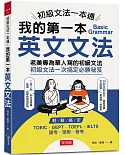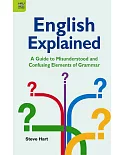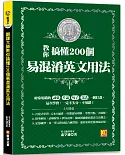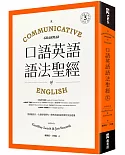Part 1 Nouns 名詞
Unit 1 Singular and Plural Nouns: Regular 單數與複數名詞:規則名詞
Unit 2 Singular and Plural Nouns: Irregular 單數與複數名詞:不規則名詞
Unit 3 Countable and Uncountable Nouns 可數與不可數名詞
Unit 4 List of Common Uncountable Nouns 常見不可數名詞表
Unit 5 Nouns Always in Plural Forms 只以複數形態出現的名詞
Unit 6 Counting Uncountable Nouns 不可數名詞的計算
Unit 7 Proper Nouns and Collective Nouns 專有名詞與集合名詞
Unit 8 Compound Nouns 複合名詞
Unit 9 Possessive 's: Forms 所有格「’s」的形式
Unit 10 Possessive 's: Use 所有格「’s」的用法
Unit 11 “The . . . Of . . .” for Possession 「The . . . Of . . .」表示「所有權」的用法
Part 2 Articles 冠詞
Unit 12 A, An 不定冠詞A、An
Unit 13 The 定冠詞The
Unit 14 Talking in General 「泛指」的用法
Unit 15 Expressions With “The” (1) 要加The的情況(1)
Unit 16 Expressions With “The” (2) 要加The的情況(2)
Unit 17 Expressions Without “The” (1) 不加The的情況(1)
Unit 18 Expressions Without “The” (2) 不加The的情況(2)
Unit 19 Place Names With or Without “The” 專有地名加The或不加The
Unit 20 Expressions With or Without “The” With Different Meanings 加The或不加The意義不同的用語
Part 3 Pronouns 代名詞
Unit 21 Personal Pronouns: Subject and Object Pronouns 人稱代名詞:「主格代名詞」與「受格代名詞」
Unit 22 Common Usages of Subject and Object Pronouns 「主格代名詞」與「受格代名詞」的常見用法
Unit 23 Possessive Pronouns and Possessive Adjectives 「所有格代名詞」與「所有格形容詞」
Unit 24 Reflexive Pronouns (1) 反身代名詞(1)
Unit 25 Reflexive Pronouns (2) 反身代名詞(2)
Part 4 Quantity 數量
Unit 26 Expressions for Quantity 表示「數量」的用語
Unit 27 Indefinite Pronouns for Quantity 表示「數量」的不定代名詞
Unit 28 Indefinite Pronouns With Singular or Plural Verbs 不定代名詞搭配單數動詞或複數動詞
Unit 29 “Some” and “Any” Some與Any
Unit 30 “Many” and “Much” Many與Much
Unit 31 “Few” and “Little” Few與Little
Unit 32 Both Both
Unit 33 “Either” and “Neither” Either與Neither
Unit 34 All All
Unit 35 “All,” “Every,” and “Whole” All、Every、Whole
Unit 36 “No” and “None” No與None
Unit 37 “One” and “Ones” One與Ones
Unit 38 Indefinite Pronouns With Some-, Any-, Every-, No- 以Some-、Any-、Every-、No- 開頭的不定代名詞
Part 5 Present Tenses 現在式
Unit 39 Introduction 動詞的時態介紹
Unit 40 Present Simple Tense 現在簡單式
Unit 41 Present Continuous Tense 現在進行式
Unit 42 Comparison Between the Present Simple and the Present Continuous
「現在簡單式」與「現在進行式」的比較
Unit 43 Verbs Not Used in the Continuous Forms 不能用於進行式的動詞
Unit 44 Verbs Used in the Present Simple and the Present Continuous With Different Meanings
用於「現在簡單式」與「現在進行式」意義不同的動詞
Part 6 Past Tenses 過去式
Unit 45 Past Simple Tense 過去簡單式
Unit 46 List of Irregular Verbs 不規則動詞表
Unit 47 Past Continuous Tense 過去進行式
Unit 48 Comparison Between the Past Simple and the Past Continuous
「過去簡單式」與「過去進行式」的比較
Unit 49 Continuous Forms With “Always” for Expressing Complaints 進行式搭配Always表示抱怨的用法
Part 7 Perfect Tenses 完成式
Unit 50 Present Perfect Simple Tense (1) 現在完成式(1)
Unit 51 Present Perfect Simple Tense (2) 現在完成式(2)
Unit 52 Present Perfect Simple With Some Adverbs and Prepositions 常與現在完成式連用的一些副詞與介系詞
Unit 53 Comparison Between the Present Perfect Simple and the Past Simple (1)
「現在完成式」與「過去簡單式」的比較(1)
Unit 54 Comparison Between the Present Perfect Simple and the Past Simple (2)
「現在完成式」與「過去簡單式」的比較(2)
Unit 55 Present Perfect Continuous Tense 現在完成進行式
Unit 56 Comparison Between the Present Perfect Continuous and the Present Perfect Simple (1)
「現在完成進行式」與「現在完成式」的比較(1)
Unit 57 Comparison Between the Present Perfect Continuous and the Present Perfect Simple (2)
「現在完成進行式」與「現在完成式」的比較(2)
Unit 58 Past Perfect Simple Tense 過去完成式
Unit 59 Past Perfect Continuous Tense 過去完成進行式
Part 8 Future Tenses 未來式
Unit 60 Simple Future “Will” 未來簡單式Will
Unit 61 “Be Going to” for the Future Be Going To表示未來意義的用法
Unit 62 Comparison Between the Simple Future “Will” and “Be Going To” 未來簡單式Will與Be Going To的比較
Unit 63 Present Continuous for the Future and the Comparison With “Be Going To”
現在進行式表示未來意義的用法,以及與Be Going To的比較
Unit 64 Present Simple for the Future 現在簡單式表示未來意義的用法
Unit 65 Future Continuous Tense 未來進行式
Unit 66 Future Perfect and Future Perfect Continuous 「未來完成式」與「未來完成進行式」
Part 9 Verbs: Essential Usages 動詞的一些重要用法
Unit 67 “Have” and “Have Got” Have與Have Got的用法
Unit 68 “Have” for Action Have當作行為動詞的用法
Unit 69 Be Being Be Being的用法
Unit 70 Linking Verbs 連綴動詞
Unit 71 Causative Verbs: Make, Have, Get 使役動詞Make、Have、Get的用法
Unit 72 Causative Verb: Let Let當作使役動詞的用法
Part 10 Infinitives and -ing Forms 不定詞與動名詞
Unit 73 Infinitives and -ing Forms 不定詞與動名詞
Unit 74 Verbs Followed by Infinitives 要接不定詞的動詞
Unit 75 Verbs Followed by Objects and Infinitives 通常要接受詞再接不定詞的動詞
Unit 76 Verbs Followed by -ing Forms 要接動名詞的動詞
Unit 77 Verbs Followed by -ing Forms or Infinitives With the Same Meaning 接動名詞或不定詞意義相同的動詞
Unit 78 Verbs Followed by -ing Forms or Infinitives With Different Meanings (1)
接動名詞或不定詞意義不同的動詞(1)
Unit 79 Verbs Followed by -ing Forms or Infinitives With Different Meanings (2)
接動名詞或不定詞意義不同的動詞(2)
Unit 80 Infinitives Used as Complements and Infinitives of Purpose 不定詞當作補語和表示「目的」的用法
Unit 81 Prepositions With -ing Forms 介系詞接動名詞
Unit 82 “Need” and “See” With -ing Forms or Infinitives Need與See接動名詞與不定詞的用法
Unit 83 Participle Phrases and Participle Clauses 分詞片語與分詞子句
Unit 84 Yes/No Questions Yes/No疑問句
Part 11 Phrasal Verbs 片語動詞
Unit 85 Phrasal Verbs: Two Words, Transitive, and Separable 片語動詞:兩個字、及物、可分
Unit 86 Phrasal Verbs: Two Words, Transitive, and Nonseparable (1) 片語動詞:兩個字、及物、不可分(1)
Unit 87 Phrasal Verbs: Two Words, Transitive, and Nonseparable (2) 片語動詞:兩個字、及物、不可分(2)
Unit 88 Phrasal Verbs: Two Words and Intransitive 片語動詞:兩個字、不及物
Unit 89 Phrasal Verbs: Three Words 片語動詞:三個字
Unit 90 Phrasal Verbs: Usages With Slight Variations in Meaning 片語動詞:不同用法細微的意義差異
Part 12 Modal Verbs (1) 情態動詞(1)
Unit 91 Modal Verbs: General Use (1) 情態動詞的一般用法(1)
Unit 92 Modal Verbs: General Use (2) 情態動詞的一般用法(2)
Unit 93 Ability: Can, Be Able To 表示「能力」:Can、Be Able To
Unit 94 Ability: Could, Be Able To 表示「能力」:Could、Be Able To
Unit 95 Permission: Can, Could, May 表示「許可」:Can、Could、May
Unit 96 Obligation and Necessity: Must, Have To 表示「義務與必要」:Must、Have To
Unit 97 Obligation and Necessity: Have to, Have Got to 表示「義務與必要」:Have To、Have Got To
Unit 98 Obligation and Choices: Mustn't, Don't Have To, Haven't Got To, Don't Need To, Needn't, Didn't Need To
表示「義務與選擇」:Mustn’t、Don’t Have To、Haven’t Got To、Don’t Need To、Needn’t、Didn't Need To
Unit 99 Obligation and Advice: Should, Ought To, Shall 表示「義務與建議」:Should、Ought To、Shall
Unit 100 Obligation and Advice: Had Better, Be Supposed To 表示「義務與建議」:Had Better、Be Supposed To
Part 13 Modal Verbs (2) 情態動詞(2)
Unit 101 Possibility: May, Might, Could 表示「可能性」:May、Might、Could
Unit 102 Possibility: Can, Should, Ought To 表示「可能性」:Can、Should、Ought To
Unit 103 Deduction: Must, Can’t 表示「推論」:Must、Can’t
Unit 104 Requests: Can, Could, May, Will, Would 表示「要求」:Can、Could、May、Will、Would
Unit 105 Offers: Will, Shall, Can, Could, Would 表示「提供幫助或物品」:Will、Shall、Can、Could、Would
Unit 106 Suggestions: Shall, Let’s, Why Don’t We, How About, What About, Can, Could
表示「建議」:Shall、Let’s、Why Don’t We、How About、What About、Can、Could
Unit 107 Habits: Used To 表示「習慣」:Used To
Unit 108 Habits: Will, Would 表示「習慣」:Will、Would
Unit 109 Other Uses of “Will,” “Won't,” and “Wouldn't” Will、Won’t、Wouldn’t的其他用法
Unit 110 “Would Rather” and “May/Might As Well” Would Rather與May/Might As Well 的用法
Unit 111 Important Uses of “Should” Should的重要用法
Part 14 Adjectives 形容詞
Unit 112 Form, Position, and Order of Adjectives 形容詞的形式、位置與順序
Unit 113 Comparative and Superlative Adjectives: Forms 形容詞比較級與最高級的形式
Unit 114 Comparative and Superlative Adjectives: Use 形容詞比較級與最高級的用法
Part 15 Adverbs 副詞
Unit 115 Adverbs of Manner 狀態副詞/方式副詞
Unit 116 Adverbs of Time and Place 時間副詞與地方副詞
Unit 117 Adverbs of Frequency 頻率副詞
Unit 118 Adverbs of Probability 可能性副詞
Unit 119 Adverbs of Degree 程度副詞
Unit 120 Adverbs “Still,” “Yet,” and “Already” 副詞Still、Yet、Already的用法
Unit 121 Adverbs “Too” and “Enough” 副詞Too、Enough的用法
Unit 122 Adverbs “So,” “Such,” “Anymore/Longer,” and “No Longer”
副詞So、Such、Anymore/Longer、No Longer的用法
Part 16 Linking Words 連接語
Unit 123 Linking Words of Time: When, As, While, As Soon As, Before, After, Until
表示「時間」的連接語:When、As、While、As Soon As、Before、After、Until
Unit 124 Linking Words of Contrast: Although, Even Though, Though, However, In Spite Of, Despite, While, Whereas
表示「對比」的連接語:Although、Even Though、Though、However、In Spite Of、Despite、While、Whereas
Unit 125 Linking Words of Reason: Because, Because Of, As, Since, Due To
表示「因果」的連接語:Because、Because Of、As、Since、Due To
Unit 126 Linking Words of Result: So, As a Result, Therefore, So . . . That, Such . . . That
表示「結果」的連接語:So、As A Result、Therefore、So . . . That、Such . . . That
Unit 127 Linking Words of Purpose: To, In Order To, So As To, For, So That
表示「目的」的連接語:To、In Order To、So As To、For、So That
Unit 128 Linking Words of Purpose: In Case 表示「目的」的連接語:In Case
Part 17 Prepositions of Place and Movement 表示地點與移動方向的介系詞
Unit 129 Prepositions of Place: Basic Meanings Of “In,” “At,” and “On”
表示地點的介系詞:In、At、On的基本意義
Unit 130 Prepositions of Place: “In,” “At,” and “On” With Different Locations
表示「地點」的介系詞:In、At、On說明各種地點的用法
Unit 131 Prepositions of Place: Over, Under, Above, Below, Underneath
表示「地點」的介系詞:Over、Under、Above、Below、Underneath
Unit 132 Prepositions of Place: In Front Of, Behind, Opposite, Between, Among
表示「地點」的介系詞:In Front Of、Behind、Opposite、Between、Among
Unit 133 Prepositions of Place: Near, Next To, By, Beside, Against, Inside, Outside
表示「地點」的介系詞:Near、Next To、By、Beside、Against、Inside、Outside
Unit 134 Prepositions of Movement: In, Into, Out Of, On, Onto, Off
表示「移動方向」的介系詞:In、Into、Out Of、On、Onto、Off
Unit 135 Prepositions of Movement: Up, Down, From, To, Toward
表示「移動方向」的介系詞:Up、Down、From、To、Toward
Unit 136 Prepositions of Movement: Along, Across, Over, Through, Past, Around
表示「移動方向」的介系詞:Along、Across、Over、Through、Past、Around
Unit 137 Transport: Get In, Get Out Of, Get On, Get Off, By, On, In
表示「交通方式」的詞彙:Get In、Get Out Of、Get On、Get Off、By、On、In
Part 18 Prepositions of Time 表示時間的介系詞
Unit 138 Prepositions of Time: In, At, On (1) 表示「時間」的介系詞:In、At、On(1)
Unit 139 Prepositions of Time: In, At, On (2) 表示「時間」的介系詞:In、At、On(2)
Unit 140 Prepositions of Time: For, Since, Before (Compared With the Adverb “Ago”)
表示「時間」的介系詞:For、Since、Before(與副詞Ago 比較)
Unit 141 Prepositions of Time: During (Compared With “In,” “For,” and “While”)
表示「時間」的介系詞:During(與In、For、While 比較)
Unit 142 Prepositions of Time: By, Until, From . . . To, From . . . Until, Before, After
表示「時間」的介系詞:By、Until、From . . . To、From . . . Until、Before、After
Part 19 Other Prepositions 其他介系詞
Unit 143 Individual Usage Of Prepositions: With, By, In, On
一些介系詞的個別用法:With、By、In、On
Unit 144 Individual Usage of Prepositions: Like, As (Compared With “As If”)
一些介系詞的個別用法:Like、As(與連接詞As If 比較)
Unit 145 Indirect Objects With or Without “To” and “For” To與For搭配間接受詞的用法
Unit 146 Adjectives With Specific Prepositions (1) 形容詞所搭配的特定介系詞(1)
Unit 147 Adjectives With Specific Prepositions (2) 形容詞所搭配的特定介系詞(2)
Unit 148 Nouns With Specific Prepositions (1) 名詞所搭配的特定介系詞(1)
Unit 149 Nouns With Specific Prepositions (2) 名詞所搭配的特定介系詞(2)
Unit 150 Verbs With Specific Prepositions 動詞所搭配的特定介系詞
Unit 151 Prepositional Phrases 慣用的介系詞片語
Unit 152 Review of Prepositions 介系詞總複習
Part 20 Types of Sentences 句子的種類
Unit 153 Wh- Questions Wh-疑問句
Unit 154 Question Words: What, Who, Which, Whose 疑問詞:What、Who、Which、Whose
Unit 155 Question Words: Where, When, Why, How 疑問詞:Where、When、Why、How
Unit 156 Negative Questions 否定疑問句
Unit 157 Tag Questions 附加問句
Unit 158 Tag Questions: Other Forms 特殊的附加問句形式
Unit 159 Reply Questions 回應式疑問句
Unit 160 Indirect Questions 間接問句
Unit 161 Short Replies With “So Do I,” “Neither Do I,” etc. So Do I、Neither Do I等簡答句型
Part 21 Passive Voice 被動語態
Unit 162 The Passive: Forms 被動語態的形式
Unit 163 The Passive: General Use 被動語態的一般用法
Unit 164 Verbs With Two Objects and the Use of “By” and “With” in the Passive
雙受詞的動詞,以及By與With在被動句裡的用法
Unit 165 Some Common Passive Sentence Structures 常見的被動句型
Unit 166 Have Something Done Have Something Done的用法
Part 22 Subjunctive Mood and Conditionals 假設語氣與條件句
Unit 167 “Wish” and “If Only” Wish與If Only的用法
Unit 168 “If” Sentences: Real Present or Future Conditionals If子句:現在或未來有可能發生的真實假設
Unit 169 General Conditionals: Repeated Events or Truth 表示「習慣」或「真理」的條件句
Unit 170 “If” Sentences: Unreal Present or Future Conditionals If子句:與現在或未來事實相反的條件句
Unit 171 “If” Sentences: Unreal Past Conditionals If子句:與過去事實相反的條件句
Unit 172 Conditional Clauses Without “If” 不使用If的條件子句
Unit 173 “It's Time” in Subjunctive Mood and “And/Or” in Conditionals
It's Time的假設用法與And/Or表示「條件」的用法
Part 23 Reported Speech 間接引述
Unit 174 Direct and Reported Speech 直接引述與間接引述
Unit 175 Reported Speech: Verb Forms (1) 間接引述的動詞時態(1)
Unit 176 Reported Speech: Verb Forms (2) 間接引述的動詞時態(2)
Unit 177 Reported Speech: Changes of Pronouns, Adjectives, and Adverbs 間接引述的代名詞、形容詞與副詞的變化
Unit 178 Reported Questions 間接引述疑問句
Unit 179 Reported Speech Using the “To Infinitive” 使用不定詞的間接引述句
Part 24 Relative Clauses 關係子句
Unit 180 Restrictive and Non-Restrictive Relative Clauses 限定關係子句與非限定關係子句
Unit 181 Restrictive Relative Clauses With “Who,” “Which,” and “That”
以Who、Which、That引導的限定關係子句
Unit 182 Leaving out Objective Relative Pronouns in Restrictive Relative Clauses
限定關係子句中受詞關係代名詞的省略
Unit 183 Restrictive Relative Clauses With “Whose,” “Where,” “When,” and “Why/That”
以Whose、Where、When、Why/That引導的限定關係子句
Unit 184 Non-restrictive Relative Clauses 非限定關係子句
Unit 185 Relative Clauses With Prepositions 搭配介系詞的關係子句





















